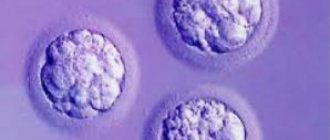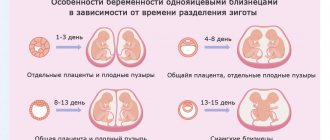Diarrhea is not the most pleasant topic of conversation, but there is absolutely nothing to be ashamed of. Every person has had diarrhea in their life, and diarrhea during pregnancy is a fairly common occurrence.
Sometimes diarrhea (the scientific name for diarrhea) can be a symptom of preterm labor, but most often it is something completely unrelated to pregnancy. This is most likely a symptom of food poisoning or a reaction to sudden changes in diet. Here we'll cover what causes diarrhea during pregnancy, how to treat it, and when to see a doctor.
Diarrhea in early pregnancy
Diarrhea itself is not an early sign of pregnancy. However, in the first trimester, loose stools during pregnancy and other digestive disorders are quite likely.
In the early stages of pregnancy, the body undergoes many transformations, which can also affect digestion, such as causing constipation or diarrhea. In particular, an increase in the level of the hormone progesterone in the blood often slows down the digestion process and leads to constipation.
Changes in diet during pregnancy can also lead to digestive problems. For example, diarrhea during pregnancy can result from eating too much fiber, and taking prenatal vitamins can often affect stool frequency and consistency.
Eating foods rich in fiber, such as fruits, vegetables and grains, can often help relieve constipation, but can also cause bloating, cramps or diarrhea if changes in diet are too drastic.
Sometimes, to solve both problems, it is recommended to drink more water - this helps with constipation and restores the body from dehydration caused by diarrhea. If you are concerned about digestive problems early in pregnancy, such as bloating or diarrhea, consult your doctor.
And if in the early stages you are interested in knowing when approximately the baby will be born, use our due date calculator.
Gurgling in the stomach during pregnancy
19.07.2021
Pregnancy is both a wonderful period in a woman’s life and a tiring one due to associated ailments. Each expectant mother experiences this time differently. Every month of pregnancy brings a lot of excitement and emotions. First ultrasound , heartbeat, gender determination. But it's also a time of worry and doubt about pregnancy . One of them is the feeling of gurgling in the stomach , which accompanies every expectant mother. Below you will find the necessary information about this disease.
Gurgling in the stomach in the first trimester of pregnancy
You, like other expectant mothers, may be wondering whether this condition is related to the baby's movements or a digestive system disorder. Morning sickness, vomiting, a feeling of fullness and strange gurgling... These are all common symptoms of early pregnancy . This is due to the fact that various processes of hormonal changes begin in your body.
Your uterus continues to enlarge, putting pressure on your stomach , leading to nausea and vomiting, heartburn , and a gurgling stomach . In addition, you have an increased appetite and experiment with food and flavor combinations. This makes it very easy to get an upset stomach .
A strange gurgling sound in the stomach during pregnancy can also be the result of an interruption in the flow of food through the intestines due to its displacement. Hormonal changes are also responsible for various types of aversions to food, drinks and smells. If you've always loved coffee and are now upset at the thought of it, you can rest assured that your hormones .
Many expectant mothers also complain of constipation or diarrhea in early pregnancy , which is also accompanied by strange gurgling sounds in the stomach . In conclusion, if you notice these symptoms in yourself, it is completely normal.
Gurgling in the stomach in the second trimester of pregnancy
A gurgling sensation later in pregnancy signifies your baby's first movements. If this is your first pregnancy , you may mistake it for a rumbling stomach or hunger. At first it is difficult to distinguish them from bowel . Do not worry. The only solution to start telling the difference is to listen to your tummy.
Usually, the first movements and “gurgling” of the baby can be felt from the 16th week of pregnancy , but each woman’s body reacts to them individually. If you are at 20 weeks and have just felt your first baby movements and your pregnancy is progressing normally, then you have nothing to worry about. Much depends on the sensitivity of the nerve endings of the expectant mother, as well as on the position of the baby, the placenta and the volume of amniotic fluid that protects the baby. If you are still concerned, ask your gynecologist for an ultrasound to evaluate your baby's health and development. Can you hear the heartbeat? It knocks for you, which means you don't have to worry anymore.
Whether you experience stomach gurgling early or late in pregnancy also depends on your body shape. Thin expectant mothers usually “hear” the baby earlier than mothers who have a little more excess fat.
Gurgling in the stomach in the third trimester of pregnancy
During the last trimester, you may experience less and less stomach gurgling associated with your baby's movements, and more and more kicking and playing with your baby. Hormonal changes continue to occur in your body, and sometimes expectant mothers catch their biggest nightmare at this stage - heartburn . This is because the uterus puts pressure on the stomach . Sometimes the gurgle that used to mean "cheerfulness" turns into intestinal problems such as constipation , diarrhea and gas . However, if you feel anxious all the time, contact a pregnancy and childbirth gynecologist who will answer annoying questions and dispel any doubts.
These are the last weeks when you are carrying a baby under your heart , and your body is preparing for the most important event - childbirth . The belly sinks lower and lower, the amount of amniotic fluid decreases, and the child has less and less room to play. Soon you will be able to hug him.
A gurgling stomach during pregnancy is not a cause for concern. This is how your baby communicates with you directly from your belly . It's also worth remembering that just as every mom-to-be reacts differently to the hormonal changes associated with pregnancy , every baby in her belly is different. However, if something is bothering you, don’t be afraid to talk to your doctor .
Published in Pregnancy and pregnancy management Premium Clinic
Is diarrhea during late pregnancy a sign of preterm labor?
Premature birth may be indicated by nagging pain in the lower abdomen that appears at the 37th week of pregnancy or earlier, which can sometimes be accompanied by diarrhea.
Here are other possible signs of premature birth:
- the consistency of vaginal discharge changes (becomes watery, mucous or bloody);
- vaginal discharge becomes more abundant;
- nagging pain appears in the pelvic area;
- back ache;
- periodic or frequent contractions are felt;
- the waters recede.
If you think you are going into preterm labor, call your doctor as soon as possible.
Other causes of diarrhea during pregnancy
There can be many causes of diarrhea - both during pregnancy and in all other cases. Let's talk about the most common of them.
Food poisoning
Unfortunately, no one is immune from food poisoning, and it can strike anyone at any time, including expectant mothers.
To some extent, you can protect yourself from possible poisoning by excluding certain high-risk foods from your diet. For example, during pregnancy it is better to avoid cold cuts, unpasteurized milk and cheese, seafood without the necessary heat treatment and raw eggs.
Take precautions when preparing food. Before cooking, be sure to wash your hands. Prepare a hot soapy solution and wipe down all kitchen surfaces.
Severe poisoning is fraught with complications - for example, it can lead to premature birth. Therefore, if there are any signs of food poisoning (nausea, vomiting and/or diarrhea), it is recommended to consult a doctor immediately.
During pregnancy diarrhea, the body loses a lot of fluid and is at risk of dehydration and electrolyte imbalance. If you have diarrhea during pregnancy, drinking plenty of fluids is recommended. In some cases, doctors prescribe intravenous fluids when signs of dehydration appear, as well as antibiotics.
Irritable bowel syndrome
If you have chronic irritable bowel syndrome (IBS) or frequently experience symptoms such as cramping, flatulence, bloating, bowel movements that alternate between constipation and diarrhea, talk to your doctor about how you can relieve these symptoms and prevent diarrhea during pregnancy.
The causes of IBS are not fully understood, but doctors believe that exacerbations can occur as a result of stress, overeating or even travel. Also, certain medications or foods can cause exacerbations.
Traveler's diarrhea
If you plan to travel during pregnancy, you must continue to follow the same dietary restrictions as before. Tourists in developing countries often experience so-called traveler's diarrhea. It occurs from eating raw foods, foods without sufficient heat treatment, or water from local sources. Before traveling, it is recommended to consult a doctor about precautions depending on the country of destination. Recommendations in each case may be different, but some of them will be useful for everyone to follow:
- Instead of tap water, it is better to drink bottled water. If only tap water is available, it is recommended to drink it boiled.
- Don't eat foods such as greens or fruits that might have been washed under the tap.
- Choose fruits with skins that you can peel yourself.
- It is better to eat thermally processed foods.
- It is highly discouraged to buy fast food on the street - it is impossible to control whether hygiene rules are followed there, and therefore the risk of getting poisoned increases.
If traveler's diarrhea cannot be avoided, it is recommended to drink plenty of water to prevent dehydration. Try to avoid dairy products and drinks containing caffeine - they can only make diarrhea worse. Just in case, it is recommended to call your doctor to get a prescription for anti-diarrhea medications or other medications.
YOU MAY ALSO LIKE
Pregnancy symptoms
How to deal with constipation during pregnancy
Viral infections
Many contagious viral infections, such as norovirus, cause diarrhea and vomiting, which can lead to dehydration.
Pathogens of gastrointestinal infections can enter the body through contaminated food, through water and drinks, from infected people, and even through touching surfaces with which the patient has been in contact.
To protect yourself from infection, it is recommended to wash your hands frequently and thoroughly wash all fruits and vegetables. If you are sick and suspect you have the virus, contact your doctor right away.
Frozen pregnancy: signs in the early stages
03.09.2021
Fetal freezing during pregnancy is a common pathology. With this diagnosis, the child stops developing in utero.
In this case, the fetus remains in the uterine , and no miscarriage occurs. ST often occurs in early pregnancy . Freezing in 20% of cases
occurs in the first trimester. But sometimes development stops between 12 and 22 weeks.
How to determine a frozen pregnancy before examination
When conception occurs, the child begins to actively develop and gain weight, which contributes to an increase in the size of the uterus . For each period
There is a certain norm for belly . If during the examination, the doctor realizes that the size of the uterus does not correspond to the established period, he
refers the pregnant woman for additional examination. Depending on the period, the expectant mother is sent for an ultrasound or the heartbeat is listened to
fetus using a special device. In addition to the basic examination, the doctor may pay attention to signs accompanying a frozen pregnancy :
• the patient complains of chills and elevated body temperature;
• toxicosis does not go away gradually, but disappears abruptly;
• in the area of the uterus there is a feeling of heaviness, tension and pain;
• a woman feels constant weakness in her body;
• bloody or brown discharge is observed the vagina
• in later stages, freezing can be determined by the absence of fetal movement.
Note! All these signs are indirect; they cannot speak 100% about the ST. But they cannot be ignored; the cause of the ailment must be established.
If the expectant mother notices any signs, she should visit a gynecologist outside the established visit plan. In some cases, fading
the fetus passes without changes in health. In this case, developmental arrest will be detected only during an examination by a gynecologist or during screening.
Who is at risk
We can distinguish groups of women who have an increased risk of developing pathology:
1. Different blood Rh factor in the child and mother. With such a discrepancy, the woman faces frequent miscarriages. Also, the development of BD can be influenced by the patient's previous abortions. The more abortions are performed, the stronger the body resists a new pregnancy .
2. Infectious infection during pregnancy. When a virus or bacteria develops in a woman’s body, the microorganisms can infect the fetus, leading to pathologies and developmental arrest. When a pregnant woman becomes infected with chickenpox, rubella or measles, the gynecologist recommends an abortion. If the fetus develops further, at birth it will have a lot of developmental features. There is also a high chance of fetal death.
3. Hormonal imbalance. If the tests show a large amount of testosterone, but prolactin , the risk of fetal death increases. This happens in women who have an unstable menstrual cycle.
How to diagnose fetal freezing
To accurately diagnose a frozen pregnancy, the doctor can send the pregnant woman for an ultrasound examination . This is the most suitable option
to accurately determine the pathology. if the period is too short, the study is repeated a week later.
Additionally, an analysis is prescribed to determine the level of hCG. During pregnancy, this hormone constantly increases.
When the fetus dies, hCG gradually decreases. When analyzed, the amount of hormone does not correspond to the current period.
Note! Some women try to determine ST using a pregnancy . This method is not informative, since even after death
fetus, the amount hormone remains high for a long time.
Prevention of diseases
To prevent the development of frozen pregnancy , it is recommended to carefully prepare for conceiving a baby. A number of rules must be followed:
• three months before conception, you should stop drinking alcoholic beverages and smoking, and you should also exclude medications that can harm the baby;
• abortions increase the risk of fetal failure, so it is recommended to carefully monitor contraception;
• eat healthy foods for six months, normalize your daily routine and weight;
• if necessary, visit a doctor and have your hormone ;
• get tested for sexually transmitted infections, if they are detected, undergo treatment; conception is possible only three months after therapy ;
• if the expectant mother is over 35 years old, she will need to visit a geneticist ;
• three months before planning to conceive, you should start taking folic acid;
It is recommended to get vaccinated against measles, rubella and chickenpox to prevent infection during pregnancy.
Published in Pregnancy and pregnancy management Premium Clinic
What to do about diarrhea during pregnancy and how to prevent dehydration
Most often, doctors prescribe over-the-counter medications for diarrhea during pregnancy. In some cases, patients with dehydration are given intravenous fluids. If you have diarrhea in pregnant women, you should drink water more often and call a doctor at the first signs of dehydration, such as:
- strong thirst;
- dry lips and skin;
- rare or absent urination;
- dark colored urine;
- feeling tired, weak, dizzy.
When to see a doctor
You should consult a doctor if:
- diarrhea during pregnancy lasts more than two days;
- there are signs of dehydration;
- there is severe pain in the abdomen or anus;
- stools are black or bloody;
- The temperature stays above 38 °C.
FAQ
- Malfunctions of the intestines during pregnancy can be caused by completely harmless reasons. For example, diarrhea during pregnancy sometimes occurs due to stress, changes in diet, or hormonal imbalance. However, only a doctor can determine the exact cause of diarrhea.
- If diarrhea lasts more than two days, call a doctor. Your doctor can prescribe a suitable anti-diarrhea medication. If you think diarrhea is a sign of preterm labor or are concerned about your general health, consult your doctor immediately.
- In rare cases, diarrhea during pregnancy can be a harbinger of premature birth. Call your doctor if your diarrhea is accompanied by abdominal cramps, a pulling sensation in your pelvis, heavy vaginal discharge, or contractions.
Sometimes diarrhea in pregnancy is due to natural causes, such as a change in diet, but in some cases it can be a sign of something more serious, such as premature birth. In addition, this is a very unpleasant process, which can also cause dehydration, so it is still recommended to consult a doctor. He will choose the right treatment for you, and you will soon get better.
How this article was written The information presented in this article is based on expert advice published by trusted (medical and government) sources such as the American Pediatric Association and the American College of Obstetricians and Gynecologists. A complete list of links to sources used to write this article can be found at the end of the article. The information on this page is not a substitute for professional medical advice. Always consult your doctor for diagnosis and treatment.
Intestinal infections and dysbiosis during pregnancy
Summer is in full swing. As you know, July and August are the most popular holiday months. Summer always generously bestows vacationers with a chocolate tan, juicy and sweet fruits and berries, and unforgettable hours of pampering and relaxation...
However, even after completely relaxing and immersing yourself in such a long-awaited vacation, you should not forget about possible diseases that can seriously overshadow your vacation. Most often they are intestinal infections with dysbacteriosis, injuries and viral diseases. As a rule, this is due not only to local characteristics, but also to weakened immunity. Thus, the consequence of unusual nutrition is most often dysbiosis. But there may be other reasons for this illness: taking antibiotics, flying, unusual climatic conditions, fatigue, chronic gastrointestinal diseases and much more. You need to take care in advance about what your vacation will be like...
Today we will talk about nutrition during summer vacation. This is especially important for children and pregnant women. It is their organisms that are most susceptible to various influences in an unusual place. We often hear that pregnancy is not a disease. But still, pregnancy limits the usual rest. Of course, no one wants to get sick while on vacation, especially not a pregnant woman. Proper functioning of the intestines ensures reliable immunity, which is very important for the expectant mother and her baby. Both in the intestines and in the vagina, each woman creates her own individual composition of microflora, her own biocenosis. During pregnancy, due to certain reasons, it may change. This is what leads to endless colpitis or, as pregnant women themselves call it, thrush. It is worth noting that it all starts with intestinal dysfunction. If the balance is disturbed, opportunistic microorganisms displace beneficial bacteria deprived of their usual protection, which, in turn, leads to a decrease in immunity. However, any infection can lead to serious consequences.
FIGHTING DYSBACTERIOSIS
You should not immediately eat food that is unusual for you: we recommend gradually introducing new foods and dishes into your diet, especially exotic ones.- Think carefully about whether it is worth eating a new dish if it is not that healthy for your baby.
- Do not overuse fruits and freshly squeezed juices!
- Drink as much plain water as possible.
- Pay special attention to perishable foods: sweets and smoked fish. You should not buy them on the beach: in the heat they can become very dangerous not only for the pregnant woman, but also for the baby.
SYMPTOMS TO WATCH FOR:
- heaviness in the stomach;
- flatulence;
- frequent bowel movements or, conversely, constipation.
In this situation, you should switch to a healthier diet, give up unusual foods and drink more water.
WE FORM A FIRST KIT
Stocking up:
- enzymes: festal, mezim;
- probiotics that are so necessary for the intestines: bifiform, bactistatin, hilak forte, eubicor;
- interferon preparations with vitamins that will support your immunity (viferon);
- enterosorbents (activated carbon, smecta).
FOLLOW THE CHAIR
Absence of stool for more than 2-3 days is extremely undesirable, especially for children and pregnant women. You can help yourself. Watch your diet. Limit flour and sweets. Eat prunes, oatmeal, consume more vegetable oil, drink more water. Be sure to consume fermented milk products, try to walk, if you have no contraindications.
If diarrhea occurs, consult a doctor as soon as possible. On vacation, especially in another country, this is difficult to do. In this case, monitor the frequency of stool, its character, and measure body temperature. Take activated carbon or smecta. If the diarrhea stops, eat a healthy diet for a few days. If you feel unwell, have a fever, have abdominal pain, or dry mouth, be sure to consult a doctor! Diarrhea can be caused by food poisoning or an intestinal infection.
On vacation, the most common viral infections (intestinal influenza), amoebiasis, and salmonellosis.
MAIN CAUSES OF INTESTINAL INFECTION:
swimming in a dirty pond;- unwashed fruits;
- dirty hands;
- unboiled water;
- stale food;
- poorly processed food.
The most pressing question for the expectant mother is: how will an intestinal infection affect the child? It depends on the pathogen. The most dangerous, of course, are viruses. But, besides this, intestinal infections are dangerous due to their consequences: dehydration, intoxication, vomiting, which causes uterine hypertonicity, as well as increased blood clotting, etc. That is why a pregnant woman should visit a doctor as early as possible.
Before taking any drug, carefully study all contraindications.
Take care of your health and thereby increase the chances of a truly joyful and cloudless holiday!









